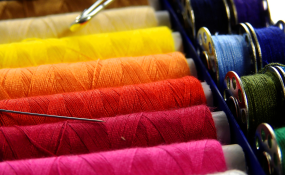By Homa Mulisa
Ethiopian textile sector is attracting top international firms amid nation’s bid to industrialize. The incumbent believes, textile would benefit large number of people and paves the way for nation to join middle income status in the very near future.
Textile is a preferable gateway for developing countries in their quest to step into industrialization because of the ease in entry. The industry was apparently one of the few key drivers of the industrial revolution in Britain and Germany. The textile industries in these countires not only were the driving forces behind the Industrial Revolution, but also revolutionized the world economy in the 18th century.
The country has launched a strategy to make the most of its potential in the textile sector. On top of the industry’s innate behavior of marketability that would suffice to ensure speedy growth, electric power abundance and a growing human and material capital are seen as advantages to reinforce textile industry in Ethiopia, Bantihun Gesese, Corporate Communications Director at Textile Industry Development Institute told The Ethiopian Herald.
Accordingly, the industry is witnessing rapid growth, as a number of domestic and multinational firms are being engaged in productions of textile, garments and apparel for domestic and global markets, added Bantihun.
The sector would facilitate technology transfer and capacity development through training, and experience sharing. It is also considered as a springboard to boost the manufacturing sector and export trade.
In the path to industrialize Ethiopia, the textile is considered to be prominent in boosting export, creating job opportunities, and accruing great deal of knowledge and experience as a model to other sectors as well, Industrial Parks Corporation CEO Sisay Gemechu stated during a press briefing for launching Hawassa Industrial Park.
For instance, he added, Africa’s largest industrial park set up in Hawassa, which is exclusively reserved for textile and apparel manufacturing is expected to remarkably boost hard currency earnings and employment.
This flagship industrial park is designed to make it capable of hosting gigantic multinational firms. The experiences gained from its operation would be used as baseline for the nation’s ongoing industrial efforts, asserted Sisay.
The Hawassa industrial park is a testimony that textile has been given due attention by the government. “The other impressive matter in this industrial park is the zero-liquid-discharge policy employed in line with the nation’s Climate Resilient Green Economy strategy. The state-of-the-art waste treatment plant, which is the first of its kind in Africa, is installed in the textile industries at Hawassa and will be expanded to other industrial zones too”, according to Sisay.
At the moment a number of other industrial parks are nearing completion, and the successes gained in the textile industry in terms of attracting anchor investors would be important for other manufacturing industries as well, not only in reinforcing nation’s industrialization but also ensuring climate resilience.
For Ethiopian Investment Commission Commissioner Fitsum Arega penetrating into the “insanely competitive” global market requires the availability of strong domestic and international manufacturers. “Hence, to successfully make our way to the international market, it is crucial to attract multinational companies. Especially companies that have established their profile in the global market are vital, as the move marked a special status for the country creating wonder among the business community” underscored Fitsum.
With the favorable conditions created at Hawassa for textile and apparel production about 18 high profile companies have entered the hub, and six has already begun exporting. The rest are also gearing up to kick off either production or export.
The other striking thing in this industrial park, according to Fitsum is the integration of the products in a complementary manner. For instance, there are companies like PVH that manufacture readymade apparels and its firms get their textile inputs from a gigantic Chinese textile manufacturer in the same premises.
As these companies are providing training to their newly recruited staff at different levels inside the country and abroad, a huge deal of knowledge and experience could be drawn from the operation that eventually guarantees an accumulated know-how for the infant industrialization.
In support of Ethiopia’s ongoing industrialization, German Development Agency, GIZ has launched a program that focuses on safeguarding better and fair conditions for industrial parks’ employees while at the same time introducing new and forward looking perspectives for nation’s industrialization process, GIZ Country Director Matthias Rompel told The Ethiopian Herald.
“The program will launch a number of capacity building training for workers in the textile industry mainly in industrial parks as well as the host communities where the projects reside, creating awareness regarding environmental and social protections”, said Rompel, ensuring GIZ’s commitment to strive in sustaining nation’s industrialization efforts through technical support.
The contribution of the manufacturing sector to the economy has been lagging behind, barely creating job opportunities contrary to its potential in overhauling the agricultural sector, said Arkebe Oqubay, speaking at the same press briefing.
This, according to him, highlights the importance of focusing on transforming the manufacturing sector. “Maintaining the economic growth that has been attested requires structural change on key areas of the economy in a way it secures value addition, boost export and create adequate jobs”, said Arkebe.
Arkebe added, letting the sector of textile lead the way to the much needed industrialization is the best way as the sector is labor intensive with excellent market value products and ample raw materials in the country.
With about 194 medium and high level textile and apparel manufacturers gone operational so far in the country, the sector has created job opportunities to nearly 90,000 citizens and secured hard currency revenue of 81 million USD in the last eleven months only.

